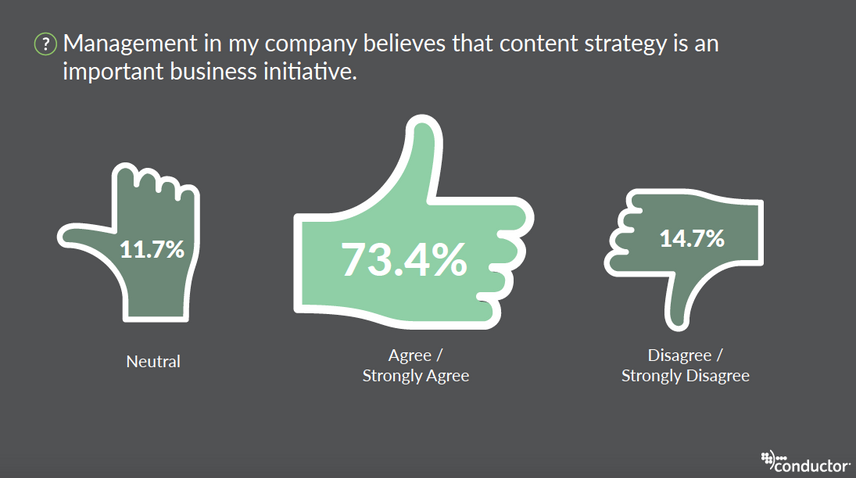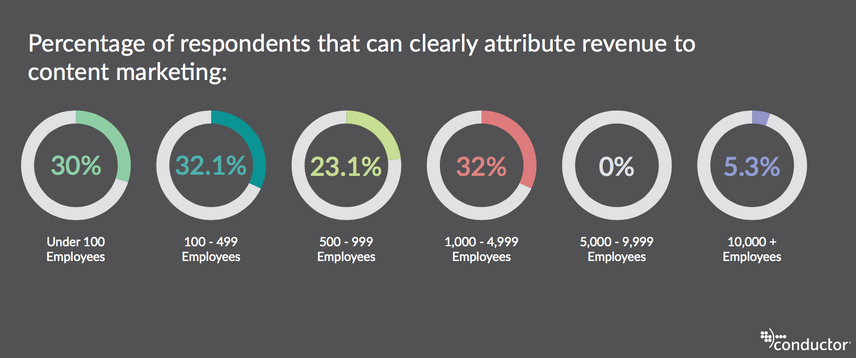[Data] The Rise of Content Leaders and What’s Holding Them Back
It's no secret content teams are becoming more and more prevalent in organizations. So why do content marketers traditionally struggle to rise to the executive level?
We surveyed Content Marketers and just 2 out of nearly 200 organizations report having a Chief Content Officer or VP of Content. (Where does content currently report? What metrics do they use? What does your content marketingContent Marketing
Content marketing is a marketing discipline with the goal of increasing awareness and scope for products and brands in the desired target group with content published on the web and offline.
Learn more career path look like?)
Content teams have buy-in. We have resources. We’re ambitious; we want to be leaders in our organizations. So why hasn’t that happened, yet? Will we get there?
Here’s the good news: content leadership is trending up. And with the rise of content marketing’s importance to companies, content marketers have increasing clout in their organizations.
But there’s a catch: we’re struggling to attribute content to revenue, especially at larger organizations, and that’s holding us back from a more successful marketing career path.
Content Is Increasingly Important, Giving Content Marketers a Better Marketing Career Path
First, the good news: Content is increasingly important, and that opens the door for leadership positions.
73% of content marketers reported that management “believe that content strategy is an important business initiative.”

Another recent marketing executive report showed that 87% of marketing executives are increasing their focus on content marketing in 2017.
Content Teams Are Young and Content Leadership Is Trending Up
Content has made big moves in the last few years, and it’s easy to forget how young our Content teams really are. They’ve been around, on average, 2-4 years.

Our research found that if content teams do have senior content leadership, it’s relatively recent, and trending up.
- Less than a third of content marketers have had a senior content marketer for over two years (28.4%), and a third do not have a senior content marketer at all (39.5%).
- Of the content marketers that DO have a senior content marketer, 49.92% have had one less than 2 years.
So if your team doesn’t have a senior content marketer yet, it may just be a matter of time. Adding dedicated leadership is a natural part of developing a new department. In the next few years we will start to see more teams with senior content leadership as the content marketing career path continues to grow.
All good signs and momentum, but there is one obstacle so glaring it could keep many of us from the top:
Struggling to Attribute Revenue Is Holding Most Content Marketers Back
Despite the rosy picture, we content marketers have reason to be nervous. It’s a golden era of content (us, and TV) but we don’t feel totally comfortable in our ascent in organizations. We’re not confident we’ll end up as leaders and executives. And the research made it clear why: we’re struggling to attribute content to revenue. In fact, the larger the organization, the more we flounder.
- From companies with under 100 employees, 30% of respondents can clearly attribute revenue to content compared to only 5.3% of respondents from companies 10,000+.
Here’s the percentage that can clearly attribute content to revenue:

This is a problem. We’re smart people; we know our success in business comes down to our impact on the bottom line. I’ve met content marketers at Fortune 100 companies who go white in the face when I ask them about content ROI. Though we know we have an impact, we’re not able to clearly attribute it with data.
And if we don’t figure out how to consistently attribute revenue to content, here’s what will happen:
- Organizations will de-prioritize content and pull away resources
- The business will appoint someone to report on revenue who is not on the content team, keeping us out of leadership roles
Luckily, new research is making it easier to attribute revenue to content marketing. In fact, recent stats show that customers who read early-stage content from a brand were 131% more likely to buy from that brand when prompted to purchase. But to rise to the top, content marketers will need even more proof of the return on their efforts.
The Key to Content Leadership: Create and Own a Framework for Revenue from Content
Stop creating content for a second. If you’re anything like me, you can get carried away with always creating, creating, creating.
It’s crucial to slow down long enough to create a framework that shows the fruits of your labor: investing in content technology, technical talent on your team, and cross-departmental processes that connect content to company earnings. Marry your content visibility, analytics, and CRM data to clearly show your influence and growth.
If we want to be leaders in our organization, we have to prioritize strong content measurement that reflects our impact on the business.







